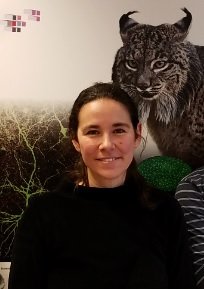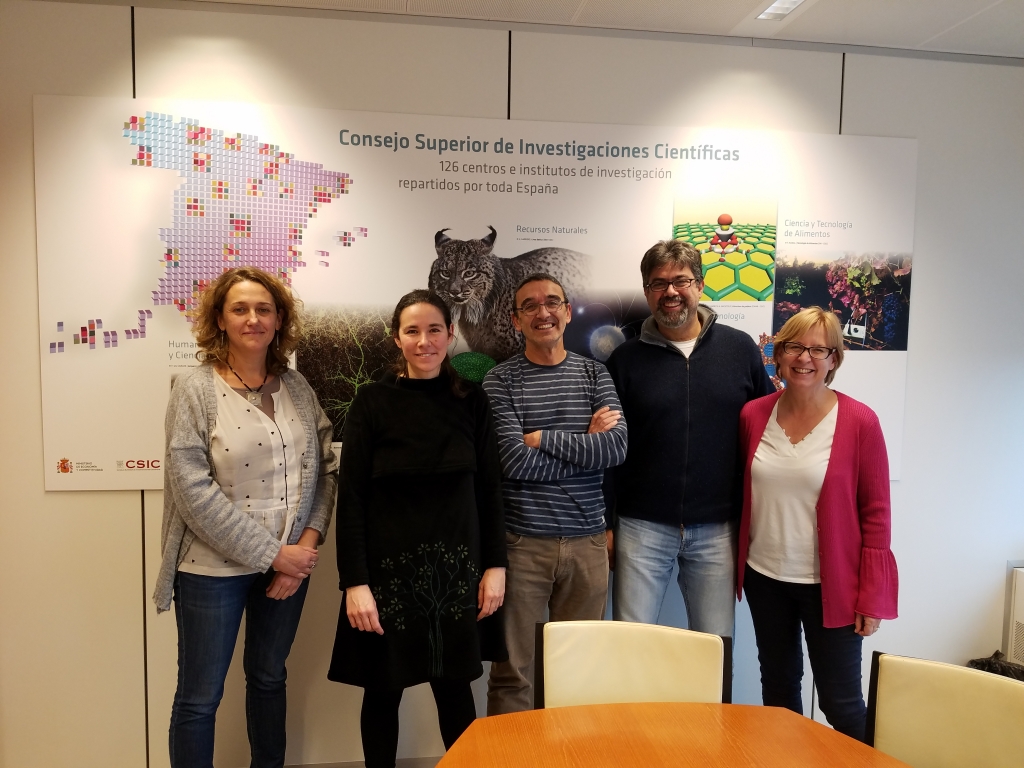
Interview to SARA PALACIO BLASCO
Graduate in Biology (with Extraordinary Prize) and PhD from the University of Barcelona, she is currently a Ramón y Cajal researcher at the Instituto Pirenaico de Ecología (CSIC). Throughout her scientific career she has developed her research in various institutions in the United Kingdom, Australia, Switzerland, Turkey, Mexico and Germany. She has participated in 22 national and international research projects, being a principal investigator in seven of them. She has supervised several master students, a doctoral thesis and is supervising two more doctoral theses. Creator of the GYPNET network for the study of gypsum ecosystems, she is currently coordinator of the European project H2020-MSCA-RISE GYPWORLD, aimed at the study of gypsum ecosystems worldwide, with 18 participating entities from 11 different countries. In addition, for several years she has participated in various project evaluation committees (Israel Science Foundation, Agence Nationale de la Recherche France, Swiss National Science Foundation, ANEP, MINECO, Fund for Scientific and Technological Research – Ministry of Science, Technology and Innovation Productive of Argentina, Spanish Association of Terrestrial Ecology). Her research focuses on analyzing the mechanisms of plants to adjust their form and function to the abiotic and biotic limitations of the environment in which they live. These issues are fundamental to understanding the response of plant species to global change and its possible consequences on the functioning of ecosystems. It normally works in semi-arid and mountainous ecosystems and is an international reference in the study of the adaptation of plants to gypsum soils.
H2020-MSCA-RISE-GYPWORLD is a global initiative to understand terrestrial ecosystems, specifically, plants that grow on gypsum soils. Could you explain roughly what the project consists of?
It is a worldwide project in which specialists in the study of different areas related to life in gypsum soils work together to advance knowledge of these ecosystems at different scales: from genes to the complete ecosystem. Gypsum floors spread throughout the planet, mainly in arid and semi-arid areas. They are very restrictive substrates for plant life but, due to their majority location outside of Europe and the West, they have received very little attention from the scientific community. Studies carried out in Spain, the US and Mexico identify them with authentic sources of biodiversity, although most of these systems are very little explored. The objective of this project is to advance in its knowledge: to know what organisms (plants and lichens) grow in them, how they have evolved to adapt to live in these soils, what mechanisms allow their survival in such a restrictive environment and how they are affecting the global change; and to make known the enormous value of these ecosystems and the need to conserve them.
One of your work packages focuses on global change, are there any indications or suspicions about its effects on plants growing on gypsum soils?
Global change includes, not only climate change, but also change in the uses of the territory. In addition to the climatic effects, which will undoubtedly be more accentuated in arid and semi-arid areas where gypsum soils appear, gypsum ecosystems are being greatly affected by how we are using these territories. The development of agriculture, urban infrastructures or the expansion of mining, among others, pose a serious threat to the conservation of these systems. In Spain there is data, for example, on how the fragmentation of gypsum habitats makes the populations of plants exclusive of this type of soil increasingly weak and vulnerable to climate change. And most worrying, these negative effects are inherited from generation to generation. But the signs are all over the world … in Mexico, the exploitation of aquifers to maintain agriculture and intensive livestock farming are drying communities in the gypsiferous zones of Cuatrociénagas. In Iran, one of the world’s largest producers of gypsum ore, unbridled mining is sweeping entire areas of the country, like the alders of the province of Semnan, with no plans to restore them … Clearly, it is necessary to send a warning message about the situation of these ecosystems globally.
The MSCA RISE actions promote the international and / or intersectoral exchange of personnel involved in R & D for the development of collaborative projects and knowledge transfer, which can be research, technical, administrative or managerial personnel. What motivated you when applying for an MSCA RISE? And to coordinate the project?
The main motivation was to be able to incorporate participants from outside Europe. In Europe, most gypsum soils are located in Spain, so many of my collaborators are outside the EU. This made it impossible for this project to participate in intra-European actions, such as COST. The MSCA-RISE scheme, on the other hand, perfectly suited our interests. In addition, the realization of stays in a coordinated way, allowed us to raise (and finance) expeditions to gypsum-rich areas little explored. It was perfect for our goals. The decision to coordinate this project was something natural, it was the step to take in my scientific career. After several years working with the casts of Spain had to expand the scale globally. I think when you have a dream you have to go for it, that’s what I did.
The consortium is made up of 18 institutions from 11 countries. What are the challenges, difficulties or obstacles that a coordinator faces in a European project of this magnitude?
For me, the main challenge is to know how to carry out a good coordination without leaving science aside. It’s what scares me most now. Our consortium is diverse and large. There are 18 institutions, but they are also in very different countries (such as the USA and Iran), each one with its cultural conditions and operating norms. In addition, the MSCA-RISE projects are difficult to implement, since they depend on the mobility of personnel and this can be complicated. I hope that the help of our Project Manager and the motivation of the whole team, allow us to solve these difficulties.
What do you think this project can contribute to the Instituto Pirenaico de Ecología? And to the research team?
This project places the IPE on the front of advancing knowledge about ecology in gypsum soils. In addition, the IPE will be the repository of the databases that are generated and its herbarium will receive duplicates of the herbarium sheets that are collected in the different botanical expeditions planned.
For the researchers who participate in it, this project means making a qualitative leap in their research. Addressing questions on a global scale, having collaborators all over the world … It will undoubtedly be a great boost for our careers and our lines of research.
The gender perspective is a cross-cutting issue in the H2020 calls. How is it addressed in the project?
The project has gender parity among the participants, as well as among the leaders of the different tasks and work packages. In addition, among the training offered by the project there is a gender equality course in science that will take place this spring in Ankara. We hope that this course can help to change the situation of women in the scientific world or, at least, that it helps to reflect on the current situation and how to change it.
In addition to dissemination to the scientific community, does the project include dissemination activities? In your opinion, do we give enough importance to the dissemination in science? And in your field of investigation?
Scientific dissemination is essential to guarantee the return of the investment made by society in the research, in addition, it is one of the requirements of the H2020 horizon. Our project foresees the realization of diverse outreach activities, such as the realization of several “Gypsum Ecosystems InfoDays”, events open to the general public in which the gypsum ecosystems and the research we are developing in them will be made known; or the publication of several documentaries showing the development of the expeditions carried out within the framework of the project.
Unfortunately, scientific dissemination activities are very little recognized in our country, and research into natural resources is no exception. I suppose it is something that will have to change in the future, even if it is to approach the European model …
Do you think that, in the future, your line of research could have a place in other actions or initiatives of European funding, such as the LIFE + program?
The LIFE + Program has a very important transfer and return to society component and could be an interesting program for projects, for example on conservation or environmental education, developed on gypsiferous soils. However, the development of the most basic lines of research and the international projection (outside of Europe) of our consortium is difficult to accommodate in most H2020 calls (calls for ideas from the ERC separately), hopefully the situation will change in the future.

